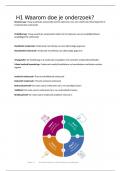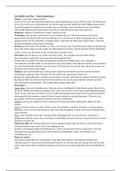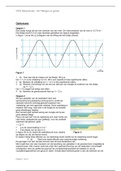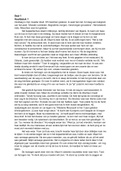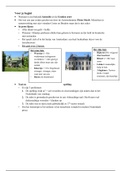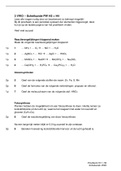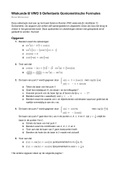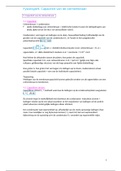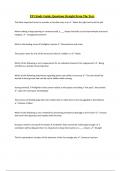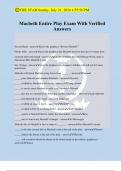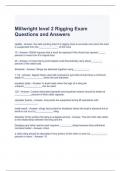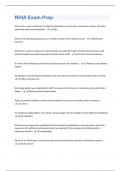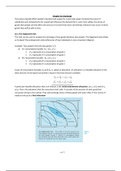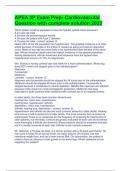Work Psychology
LECTURE 1
Organisation: a group of people who work towards the same goal; since the tasks
cannot be performed by one person, they are divided among people with different
knowledge and expertise
“I’m convinced that nothing we do is more important than hiring and developing people.
At the end of the day you bet on people, not on strategies.”
Work psychology: all about finding the right people for different tasks and making sure
they are able to deliver. In order to make people deliver we have to make sure that they
know what is expected of them and that they are motivated to do their jobs but also that
they are healthy and capable of working.
Hawthorne Studies
● first factories: noone cared about employees, their labour was cheap, tasks were
monotonous, people were seen as replaceable
● Hawthorne electric plans in the 1920 → very different: employees had access to
pension plans, vacation days etc. this factory became the setting for one of the
most important studies for the field of work psychology settings it was very
progressive → Hawthorne studies → looked at the socio psychological aspect of
human behaviour in organisations.
Workers are more responsive to social factors e.g. when the manager showed interest in
their work.
Enhanced understanding of what motivates individuals in the workplace. In addition to
personal economic needs, social needs play an important role in influencing
work-related attitudes and behaviors.
The Hawthorne Effect
Employees will perform better when they feel singled out for special attention or feel
that management is concerned about employee welfare.
Work Psychology: A branch of psychology that applies the principles of psychology to
the workplace (Aamodt, 2016) → psychology of people within a specific setting
The study of people and their behaviour at work, and of the organizations in which
people work; Work Psychologists develop psychological theory and apply the rigour and
1
,methods of psychology to issues that are important to businesses and organizations, in
order to promote and advance understanding of individual, group and organizational
effectiveness at work, and the well- being and satisfaction of people working in or
served by organizations. (Woods & West, 2014)
● Work (I/O) psychologists are able to apply psychological theories to explain
and enhance the effectiveness of human behavior in the workplace (Canadian
Psychological Association)
● Work (I/O) psychologists “enhance the dignity and performance of human
beings, and the organizations they work in, by advancing the science and
knowledge of human behavior” (Rucci, 2008)
Fields of WP
Research in WP
● Answering questions and making decisions
● Research and everyday life
● Scientist-Practitioner Model
● Acting as scientists when they conduct research and implementing these into
the actual organizations as practitioners.
● → Evidence based management → we want to create organisational policies and
manage people in line with scientific evidence instead of basing ourselves on our
gut feeling
2
,“Common” sense
[…] common sense is actually nothing more than a deposit of prejudices laid down in the
mind prior to the age of eighteen.
A. Einstein
People do not learn better when using their preferred learning style but it depends on
the nature of the material
● People’s intuitions and beliefs about human behavior often turn out to be wrong.
● People have biases (overconfidence bias, self-serving bias, confirmation bias,
representativeness heuristic, narrative fallacy, …)
● This is why we cannot rely on common sense.
False beliefs
● People do not use only 10% of their brains
● Lightning can strike twice at the same place
● Vaccines do not cause autism
● Goldfish do not have a 3-7 second memory
Some people will even come to different conclusions when given the same information
3
, Therefore:
● Decisions should be based on a combination of critical thinking and the best
available evidence.
● Using data to drive decisions
Practical tips
● Demand evidence
● Stories are persuasive but more often inaccurate and data can be boring but is
more accurate so combine them
● Appreciate how little you know
1. Ideas/questions
2. Hypotheses - well thought-out suggestions or ideas that can be tested
3. Theories - systematic sets of assumptions regarding the nature and cause of
particular events
How do you investigate it? What should you take into account when trying to assess
information?
1. Choose the correct location ( field, real world, laboratory)
field research has more external validity but there is less internal validity due to
less control over extraneous variables
survey studies (real world) have the same problems as field studies but they also
have a recollection bias meaning that people have difficulties remembering how
they felt earlier about something (usually people are asked to remember things
and report how they felt etc)
4
LECTURE 1
Organisation: a group of people who work towards the same goal; since the tasks
cannot be performed by one person, they are divided among people with different
knowledge and expertise
“I’m convinced that nothing we do is more important than hiring and developing people.
At the end of the day you bet on people, not on strategies.”
Work psychology: all about finding the right people for different tasks and making sure
they are able to deliver. In order to make people deliver we have to make sure that they
know what is expected of them and that they are motivated to do their jobs but also that
they are healthy and capable of working.
Hawthorne Studies
● first factories: noone cared about employees, their labour was cheap, tasks were
monotonous, people were seen as replaceable
● Hawthorne electric plans in the 1920 → very different: employees had access to
pension plans, vacation days etc. this factory became the setting for one of the
most important studies for the field of work psychology settings it was very
progressive → Hawthorne studies → looked at the socio psychological aspect of
human behaviour in organisations.
Workers are more responsive to social factors e.g. when the manager showed interest in
their work.
Enhanced understanding of what motivates individuals in the workplace. In addition to
personal economic needs, social needs play an important role in influencing
work-related attitudes and behaviors.
The Hawthorne Effect
Employees will perform better when they feel singled out for special attention or feel
that management is concerned about employee welfare.
Work Psychology: A branch of psychology that applies the principles of psychology to
the workplace (Aamodt, 2016) → psychology of people within a specific setting
The study of people and their behaviour at work, and of the organizations in which
people work; Work Psychologists develop psychological theory and apply the rigour and
1
,methods of psychology to issues that are important to businesses and organizations, in
order to promote and advance understanding of individual, group and organizational
effectiveness at work, and the well- being and satisfaction of people working in or
served by organizations. (Woods & West, 2014)
● Work (I/O) psychologists are able to apply psychological theories to explain
and enhance the effectiveness of human behavior in the workplace (Canadian
Psychological Association)
● Work (I/O) psychologists “enhance the dignity and performance of human
beings, and the organizations they work in, by advancing the science and
knowledge of human behavior” (Rucci, 2008)
Fields of WP
Research in WP
● Answering questions and making decisions
● Research and everyday life
● Scientist-Practitioner Model
● Acting as scientists when they conduct research and implementing these into
the actual organizations as practitioners.
● → Evidence based management → we want to create organisational policies and
manage people in line with scientific evidence instead of basing ourselves on our
gut feeling
2
,“Common” sense
[…] common sense is actually nothing more than a deposit of prejudices laid down in the
mind prior to the age of eighteen.
A. Einstein
People do not learn better when using their preferred learning style but it depends on
the nature of the material
● People’s intuitions and beliefs about human behavior often turn out to be wrong.
● People have biases (overconfidence bias, self-serving bias, confirmation bias,
representativeness heuristic, narrative fallacy, …)
● This is why we cannot rely on common sense.
False beliefs
● People do not use only 10% of their brains
● Lightning can strike twice at the same place
● Vaccines do not cause autism
● Goldfish do not have a 3-7 second memory
Some people will even come to different conclusions when given the same information
3
, Therefore:
● Decisions should be based on a combination of critical thinking and the best
available evidence.
● Using data to drive decisions
Practical tips
● Demand evidence
● Stories are persuasive but more often inaccurate and data can be boring but is
more accurate so combine them
● Appreciate how little you know
1. Ideas/questions
2. Hypotheses - well thought-out suggestions or ideas that can be tested
3. Theories - systematic sets of assumptions regarding the nature and cause of
particular events
How do you investigate it? What should you take into account when trying to assess
information?
1. Choose the correct location ( field, real world, laboratory)
field research has more external validity but there is less internal validity due to
less control over extraneous variables
survey studies (real world) have the same problems as field studies but they also
have a recollection bias meaning that people have difficulties remembering how
they felt earlier about something (usually people are asked to remember things
and report how they felt etc)
4


